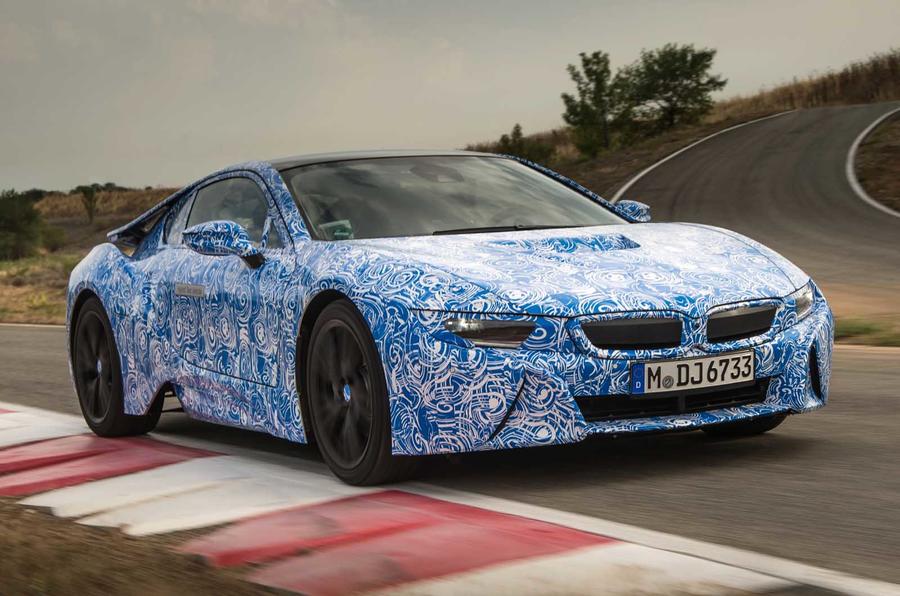What is it?
The BMW i8 is the second model from BMW’s new i brand. Driven here for the first time in prototype form, the low slung coupé is planned to go on sale in the UK next April at a price that will, BMW officials hint, pitch it into direct competition with the conspicuously more conventional Porsche 911 Carrera 4S, which retails here for £87,959.
A more extrovertly styled roadster version of the advanced hybrid, which boasts an official fuel consumption figure of over 113mpg and average CO2 emissions in hybrid mode of under 59g/km, is also under development at BMW’s Munich-based R&D centre, although it isn’t likely to see local showrooms until 2015.
Billed as a progressive sportscar, the i8 was first shown in concept car guise at the 2009 Frankfurt motor show. At the time, it ran a diesel-electric hybrid system. However, it has since made way for a petrol-electric set-up that shares various components, including its main electric motor, with the BMW i3’s exclusively electric driveline.
Like its smaller sibling, it can run in pure electric mode, but only for distances of up to 22 miles and a top speed of 75mph owing to its relatively small battery. Overall range promises to be quite spectacular thanks to a 42-litre fuel tank that is mounted underneath the rear seats. BMW is not prepared to make a figure official but it is already quite clear that the i8 will be among the most fuel efficient sportscars ever placed into production.
The i8’s styling has evolved during the four-year development phase, although the basic silhouette and flamboyant layered body design has been retained, giving the i8 a strikingly futuristic external appearance which is carried through to the snug two-plus-two interior. Length, width and height are put at 4689mm, 1942mm and 1293mm respectively, making it 449mm longer, 152mm wider and a scant 3mm taller than the second-generation BMW Z4 – a car against which the new BMW has been extensively benchmarked.
As with the i3, the i8 makes extensive use of carbonfibre and aluminium in a bid to offset the inherent weight of its advanced driveline. A so-called Life Module fashioned from carbonfibre forms the main structure, to which BMW has attached carbonfibre-framed doors and aluminum sub-frames both front and rear.
The outer body is a combination of carbonfibre (roof), aluminium (bonnet and outer door panels) and composite plastic (bumpers, fenders). BMW has also revealed the i8 will be the first production car to make use of Gorilla Glass – as seen on the latest smart phones. It is used for the rear window, providing added sound deadening properties for the interior.
A definitive figure is yet to be revealed, though the i8 is claimed to weigh less than 1490kg – undercutting the two seat Z4 sDrive35iS by 35kg despite providing accommodation for up to four adults (at a squeeze) along with 150 litres of luggage space underneath a liftback-style tailgate at the rear.
The primary form of propulsion for the i8 comes via a compact, turbocharged 1.5-litre three-cylinder petrol engine – the same B38 designated unit earmarked to head into a production version of the BMW Compact Active Tourer and third generation of the modern day Mini in 2014, albeit in a milder state of tune than the 2.0bar of turbocharger boost pressure used on the i8.



























Join the debate
Add your comment
Part of me says this is
Part of me says this is interesting and promising and yet the other part of me says it is overpriced and the real world consumption and practicality won't be that good when we see the real thing .For now I still would much rather have a GTR,as I can get 2 Sunday golf bags with full sets in the trunk and still have room for grandsons in the back seats.
Looks promising
So BMW is charging ahead with its i-cars.
While the powertrain has been done before - yet the BMW EVs and hybrids impress with their low weights.
Transitional Period
Great review.
As for those complaining, how many people reading this will actually be in a position to buy this car? Certainly the majority will not.
What this does signify though is further development and applicaiton of hybrid technology, which eventually will trickle down into the more real world cars we all drive every day.
What we can also take from this, is that with the increasing prices and deminishing supply of fossil fuels, it wont bring the death of the sports / super car.
SteFer wrote: Great
For me the achievement here is much more the lightweight carbon construction that has managed to get a hybrid down to a more sensible weight. The engine/battery combination doesnt seem anything spectacular.
Whilst this will be a good looking car, if it's priced like a 911 but isn't as good as a 911 it won't sell well, no matter how good the CO2 figures or fuel economy are, as buyers at this level really dont care that much. Would I buy this over an R8 / 911 (or even V8S F -Type)? not at the moment.
The R8 came along and did exactly what Audi needed it to do - it matched / beat the 911 in several areas, got great reviews, was good looking, sold in good numbers and raised the brand profile massively.
If the i8 can't do that it may be seen as a technical achievement but it won't be seen as a success.
Personally I dont see this
Personally I dont see this car being a success full stop.
Although I agree with you on the use of materials, it's a whole package deal and a demonstration of what they're capable of, not only a stop gap.
If I were in the market for this type of vehicle my eyes would go straight to the F-type. Other than taking the i8 out for a test drive out of pure curiosity, I wouldnt even consider it.
I wont be switching to hybrid or electric for quite a while, until it's more affordable and more viable for me needs. For now I'm perfectly happy with my oil burner.
Missing the point
Owing to its co2 rating, it is a very attractive company car proposition. cheaper as a company car than a 320d, assisted lease deals will likely make it not much more expensive than a well specced 7 series.
I'll be having one for sure - why wouldn't you?
liquidgold wrote: SteFer
Granted as a company car the CO2 would make it more favourable. As a personal car however, when looking at that sort of money, realistically it doesnt make a blind bit of difference. Except perhaps to middle class carbon guilt.
Would this really be anything other than a second car? Then again I could be completely wrong and the company / lease market could win it. In my experience outside of the city the streets are no longer paved with gold, and company car lists (and pools) have all steped down a rung or two.
liquidgold wrote: Owing to
Lease deals on a 7 series are massively supported by BMW UK because they really can't sell the thing, you can lease one for under £500 a month + vat, which are in no way representative of the typical lease cost of a £60k car.
BMW will have no reason to want to support the lease deals on this car, and it's reckoned it'll be more than £80k, so expect to pay double the cost of the 7 series lease - typical 911 deals are £1100 a month + vat upwards so expect this to be similar.
If they have to support the lease deals then the car has been a failure, and the lack of practicality and huge price means it's unlikely to be seen as / allowed as a company car apart from by the occasional successful SME owner.
BMW support
i think BMW may well have to support the car to overcome inertia towards the new tech, and to counter all the points raised in this thread, and others. If so, i think the rates will be better than those on C4S, although BMW and the leasing guys will be taking a huge punt on the residuals.
Its not realistic to expect many private buyers to leap straight into the unknown with their own £90k, so I think Bracknell will do what is required to build a UK presence of the halo i model, particularly through advantageous lease deals to the private business sector.
Orangewheels